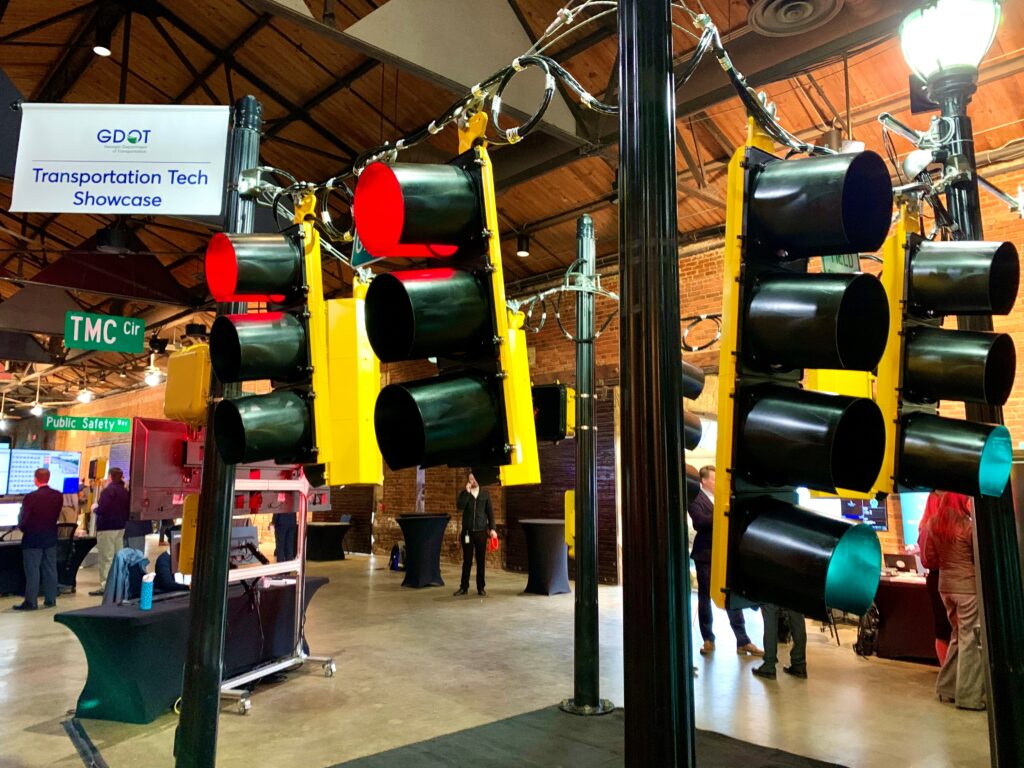
Mobile apps warning drivers that someone is about to run a red light. A button that MARTA bus operators can tap to ask for a green light. Computer programs pinpointing when a car has stalled on the side of the highway.
These tech features and more were on display Tuesday at the first annual Transportation Tech Showcase, held at the Georgia Freight Depot in downtown Atlanta. Transit-focused companies, government officials and state lawmakers were on hand to peruse tech offerings touted as solutions for easing traffic congestion in metro Atlanta and hustling freight up from the coast.
Among the gadgets and gear rolled out for public viewing Tuesday were new signals set up at traffic intersections that can send potentially life-saving information to drivers. Installed in a car’s radio system, the signals alert drivers when a traffic light is about to change colors, when a pedestrian is in a crosswalk or when another car is about to run a red light.
The signals both improve safety for today’s drivers and help lay the groundwork for automated driving technology in the future, said Alan Davis, the assistant state traffic engineer. Around 430 signals have been installed at intersections in the metro Atlanta area so far and another 1,600 will soon go up statewide at a cost of around $10 million, Davis said.
On Tuesday, Gov. Brian Kemp announced another 1,000 signals will be installed in the metro area by city and county governments, paid mostly via federal grant funds. State officials will work with the Atlanta Regional Commission to install them.
“This…is a powerful testament to what we all know to be true: Our state is moving in the right direction toward solutions,” Kemp said Tuesday.
The technology showcase came as state lawmakers began a week-long debate over Kemp’s proposed budget across the street at the Capitol. The Georgia Department of Transportation was spared budget cuts in the 2020 and 2021 fiscal years that the governor ordered for most state agencies over summer.
The transportation department’s proposed budget this fiscal year is hovering around $3.7 billion, nearly half of which would come from federal funds.
It’s unlikely any major transportation bills will come out of the current legislative session that started last week, said Senate Transportation Committee Chairman Brandon Beach, R-Alpharetta. At least, no legislation similar in scale to a 2015 measure that raised the state’s gas tax. Enacted under then-Gov. Nathan Deal, the tax has since reeled in about $900 million a year for state road construction and maintenance projects.
House Transportation Committee Chairman Kevin Tanner, R-Dawsonville, has a bill still alive this session that would drum up more money for public transit in rural areas.
But Tuesday’s program did figure into Lt. Gov. Geoff Duncan’s push for more state investment in new transportation technologies and public-private partnerships to bring them into reality. Duncan unveiled a new task force last week on technology research and development that aims to “make Georgia the technology capital of the East Coast.”
“Government’s just not very nimble at times about certain things,” Duncan said Tuesday. “Being able to partner with the private sector in a way that allows us to push the biggest and best ideas out into the market quicker is, I believe, the best way forward.”